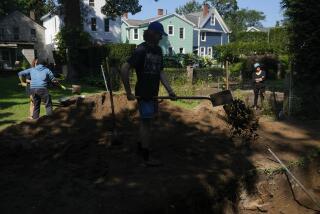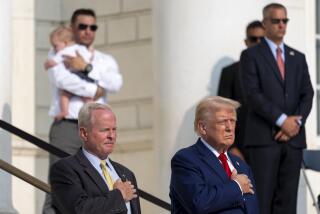Desecrated Graves Bring Survivors Renewed Grief : Probe: State officials open Santa Fe Springs cemeteryâs records to anxious relatives. But many fail to find closure.
Betty Campa stood Friday at the grave of her grandfather with tears in her eyes and the agonizing proof in her hands: Records seized from the now-infamous Paradise Memorial Park in Santa Fe Springs showed that six other bodies had been buried in the grave in 1992.
State cemetery officials told Campa the remains of her grandfather, who was buried in 1933, had been disinterred three years ago and dumped in an earthen pile at the back of the cemetery. The 7-foot-tall pile--said to contain the remains of hundreds of people--was buried in a mass grave finished Friday.
âHere I think Iâm talking to my grandfather and Iâm talking to someone else,â said Campa, 66, of Whittier, clutching a paper with the names of the others who followed--Beatrice, Alberta, Mary, Herbert . . . âThey said his bones were in that pile. Itâs too sacrilegious.â
She, like many of the more than 200 people who fanned through the cemetery Friday, came seeking a sense of closure but left in agonizing limbo.
Investigators seized the cemetery a week ago after finding evidence of illegal disinterments that enabled graves to be resold. The practice had gone on for about 30 years, investigators now say. In addition, illegal multiple burials also took place at the cemetery, and about $33,000 is missing from the cemeteryâs trust fund for future maintenance, officials said. A criminal investigation by the district attorneyâs office is continuing.
So far, investigators have turned up evidence of 228 cases of illegal burial practices, said Raymond Giunta, executive officer of the California Cemetery Board.
The cemetery had catered to poor and low-income people since the Depression, charging as little as $270. On Friday, 100 people had gathered outside its gates before it reopened at 9 a.m.
With sheriffâs deputies standing by to maintain order, about half the crowd rushed to a small office that held records indicating which graves had been desecrated. The other half headed straight onto the grounds to seek the reassurance of an undisturbed gravestone.
Hermia Quintana knelt weeping at her son Lucioâs grave, which appeared to be intact. His gravestone said in Spanish, âIn your house, Oh God, he will always live.â
âI dreamed everything was OK,â said Quintana, 62, of Los Angeles, who had not received official word that the grave had been left undisturbed.
Lucy Davis, 56, of Anaheim walked away from the spot where her grandparentsâ gravestones should have been, toward the cemetery office in search of answers from state officials.
âTheyâre not there. The tombstones are not there. Thereâs just dirt,â Davis said.
A two-hour wait later, she emerged from the office and hugged and shook the hands of some of the other worried loved ones. The records did not indicate irregularities with her relativesâ graves. And later, officials told her, she could come back and look for their tombstones, which investigators believe the operators probably stored along with 200 others in a shed on the cemetery grounds.
âI feel a little better but not totally right,â Davis said. âYou really donât know for sure.â
It was the unfinished business clouding the deaths, some of them decades old, that tore at the hearts of the survivors.
They pulled back the weeds and used their hands to scour dirt-caked gravestones. They waited for two or three hours, sometimes longer, to find out if they were victims of cemetery operators who allegedly sold graves time after time to maximize their profits on the dead.
Many had a longstanding comfort stripped from them.
âI feel the pain as if she had died today,â said Lorenza Salsido, 74, who had wanted to be buried with her mother. âI donât know if sheâs here or somewhere else.â
Deep feelings in those circumstances are not unusual, an expert said. Many people need the comfort of being able to visit a grave to renew memories and feelings toward lost loved ones. And when a grave is desecrated, itâs a painful violation.
âItâs like somebody coming in and trashing your home,â said Gerald A. Larue, gerontology professor who teaches about the psychological aspects of death and dying at USC. âItâs a violation of personhood, because in the mind of the living, the dead still have a vital role to play in memory. This is desecration.â
The investigation began after operators failed to submit a timely report on the cemeteryâs endowment fund for the second consecutive year. Cemetery operators are required by state law to put funds into an account to maintain the cemetery once it reaches capacity.
Investigators seized cemetery records showing multiple burials without permission from relatives of the deceased. The records also indicated that the operators had been disinterring remains to resell graves.
Reselling cemetery plots is a felony punishable by up to eight years in prison and a $5,000 fine per count. Burying multiple bodies in a grave without permission from family members is a misdemeanor punishable by up to one year in jail and a fine of $500 per count.
Investigators found the pile containing bone and coffin fragments in the back of the cemetery. They moved quickly to bury the remains in a mass grave, citing instances in which neighboring schoolchildren had pilfered bones. Giunta said a student was found with a part of a hipbone Thursday.
The investigation is focusing on the operators of the family-owned cemetery, Alma Fraction, 68, and her children, Victor Fortner, 48, and Felicia Fraction, 30, all of Los Angeles.
Attorney Cameron Stewart said Friday that she had been retained by six clients and plans to file a class-action lawsuit against the operators next week, seeking damages for emotional distress.
âThese people have relatives who were buried there, mothers and fathers and children, husbands and wives. To find out some of these plots were being resold and the remains of their loved ones were being uprooted and put into a mass grave is horrifying,â she said.
Times staff writer Jim Newton contributed to this story.
More to Read
Sign up for Essential California
The most important California stories and recommendations in your inbox every morning.
You may occasionally receive promotional content from the Los Angeles Times.










